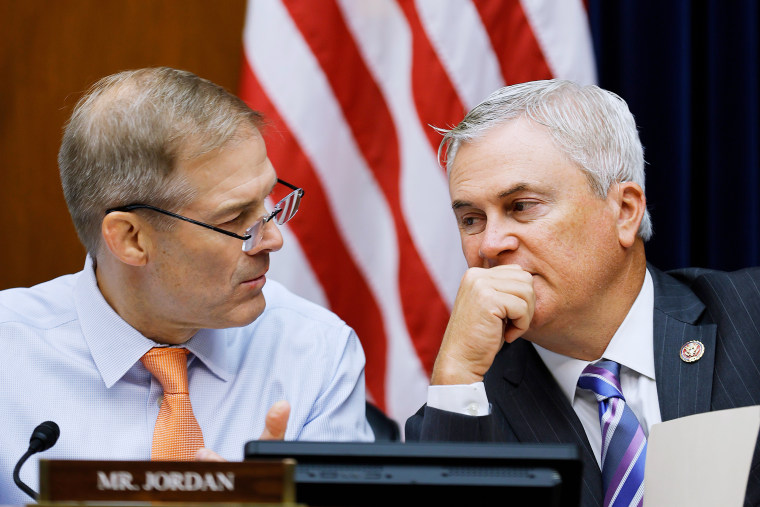There’s no shortage of problems with House Judiciary Committee Chairman Jim Jordan launching investigations into investigations, but among the practical difficulties is that his targets keep telling the Ohio Republican to go away.
As regular readers know, after Donald Trump’s first indictment, Jordan demanded information from Manhattan District Attorney Alvin Bragg about the ongoing case. The prosecutor reminded the congressman he doesn’t have jurisdiction to insert himself into criminal prosecutions at the local level.
After the former president’s indictment in Georgia, Jordan also demanded information from Fulton County District Attorney Fani Willis, who ended up not only rejecting the Republican’s outreach, but also explaining to Jordan why he’s either “ignorant” or he’s abusing his authority as part of an “attempt to obstruct and interfere” with a criminal prosecution.
The far-right Judiciary Committee chairman is having similar luck with D.C. Attorney General Brian Schwalb. Raw Story reported:
Washington, D.C. Attorney General Brian L. Schwalb sent a letter to Reps. James Comer (R-KY) and Jim Jordan (R-OH) on Tuesday said that he won’t be cooperating with their investigations into conspiracy theories about a far-right judicial activist. ... Schwalb explained that refusing to confirm or deny anything preserves the integrity of the investigation.
For those who might benefit from a refresher, let’s revisit our recent coverage and review how we arrived at this point.
In March, Politico reported that the D.C. attorney general had received a complaint alleging that Leonard Leo, a prominent conservative activist who helped create the Federalist Society, might’ve used one of his non-profit organizations to help one of his for-profit ventures. Roughly five months later, the outlet advanced the story, reporting that Brian Schwalb, the attorney general in Washington, D.C., had opened an investigation to scrutinize the claims.
This, evidently, didn’t sit well with congressional Republicans. In late October, Jordan and House Oversight Committee Chairman James Comer decided to scrutinize the scrutiny and demanded answers from Schwalb.
They gave him a deadline of Nov. 13 to “schedule a briefing on the status and scope of your investigation.” The D.C. attorney general responded that there would be no briefing.
So, the congressional Republicans tried again two weeks ago, pressing Schwalb anew to cooperate with their investigation into his alleged investigation. This week, the D.C. attorney general again said no.
“After thoughtful consideration, I must reiterate what I stated in my prior correspondence of November 13, 2023: our office has a longstanding policy — consistent with the policies of law enforcement agencies across the country — not to confirm, deny, or otherwise comment on potential or pending investigations,” he wrote. “That approach preserves the integrity of the investigative function, and nothing in your latest letter sets forth a persuasive reason for deviating from that principled, well-established policy.”
Schwalb added, “As you know, Congress has traditionally — and responsibly — refrained from requesting information from federal, state, and local law enforcement agencies while potential or pending investigations may be ongoing.”
The local prosecutor didn’t literally include the words “hint, hint” in his correspondence, but it seemed to be the subtext.
“I remain open to a productive and constructive discussion about whether we can help your Committees pursue a valid legislative purpose while not compromising long-standing, universally held law enforcement principles,” the D.C. attorney general concluded. “However, your correspondence’s refusal to acknowledge these principles or identify any valid legislative purpose, coupled with its thoroughly politicized rhetoric, would seem to cast doubt on whether such a productive discussion is possible.
"To the contrary, it strongly suggests that you would use any effort by our office to more fully engage with your inquiry for no purpose other than to amplify your erroneous and ill-founded accusation that our office is influenced by political interests. OAG is a law enforcement agency. Without fear or favor, we impartially investigate the facts, wherever they lead, and faithfully apply the law. We do not play politics. I respectfully request that your Committees not interfere with us doing our job.”
If recent history is any guide, Jordan and Comer will continue to at least try to interfere with the office doing its job. Watch this space.
This post updates our related earlier coverage.

